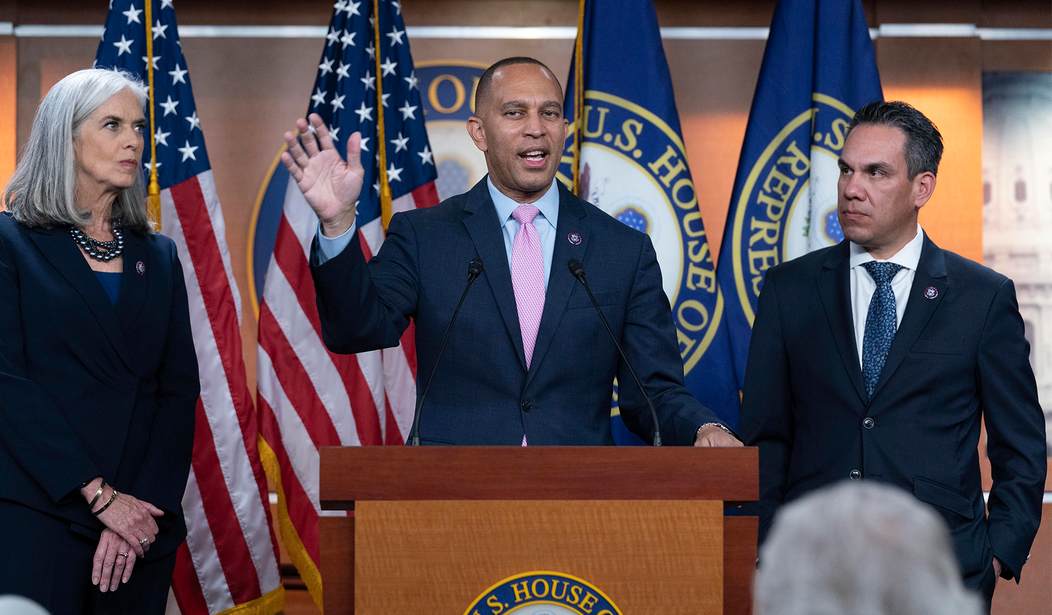The Democrats in the House of Representatives have chosen their new leadership team and, to paraphrase The Who: meet the new bosses, same as the old bosses.
There was a time in the not-too-distant past when the Democrats fancied themselves as the party of blue-collar Americans. The Republicans were — according to them — “the party of the rich.” This myth was largely built around the fact that labor unions are dominated by Democrats and in cahoots with the party. That relationship became so entrenched that the Beltway Dems began to take it for granted.
As the Democratic elders of the village shuffled off of the House leadership stage, the party decided to replace them with more proof that it’s now all but abandoned flyover country.
Rep. Hakeem Jeffries was chosen to lead House Democrats next year, making the New Yorker the first Black person to lead a major political party in Congress and marking a generational shift following the departure of three longtime chiefs.
And:
Reps. Katherine Clark (D., Mass.) and Pete Aguilar (D., Calif.) were elected to the No. 2 and 3 positions in the Democratic minority, respectively. All three Democrats ran unopposed and were elected by acclamation, without roll-call votes.
The Democrats love to crow about their policies being popular with a majority of American citizens. It’s a garbage claim for a couple of reasons, chief among them being that the party ignores a large swath of its own electorate. Most Democratic power players think they need passports to visit Middle America. They’re utterly clueless about what the majority of Americans want.
In recent years, I’ve often marveled at the fact that it seems like there are two almost distinctly different Democratic parties in the United States. There’s the party we all read about, which is dominated in D.C. by voices from the bluest of blue states and cities in America. Nancy Pelosi has been in power in the House seemingly forever and she represents one of the most radical left districts in the country. In fact, it may very well be the most radical.
Then there are the Democrats who live between the coasts, who more and more seem to not have much in common with their party leaders. It is difficult to believe that blue-collar Democrats in Ohio who are struggling with inflation are hyper-focused on making sure that first-graders are taught about gender queer fetish kink along with their ABCs.
Democrats, however, are legacy voters. They’ve been voting Democrat their whole lives because their parents did. The Big Labor connection has a lot to do with that. There have been signs that they’re not as willing to vote reflexively anymore. Donald Trump was elected because blue-collar Dems were tired of being lied to. Biden won a lot of them back by lying to them again, so they aren’t quite ready to jump in the deep end just yet.
The new House Democratic leadership reflects the fact that the party is completely ruled by its literal and ideological fringe. Jeffries is from New York City. Clark is from Boston. Aguilar’s district is a bit inland in California, making him the most “centrist” of the new upper echelon. However, he is being replaced by Ted Lieu, whose district encompasses some of the wealthiest liberal suburbs of Los Angeles. Lieu isn’t bumping into a lot of regular Americans in Santa Monica, Calabasas, or Rancho Palos Verdes.
To further reinforce the Dems’ lust for coastal rule, take a look at who Lieu beat out for his new position:
Lieu bested three other lawmakers — Reps. Joyce Beatty (D-Ohio), Debbie Dingell (D-Mich.) and Madeleine Dean (D-Pa.) — in a closed-ballot vote to secure his spot as the No. 5 House Democrat in the next Congress.
One might have thought that Pennsylvania might get thrown a bone after the state elected a non-functioning Democrat hobo to the United States Senate, but the party seems committed to keeping the worst of the Golden State in power now that Granny Boxwine is stepping off of her throne.
Democrats are notorious for taking voting blocs for granted. They don’t see individual voters, they see “the Black vote,” “the Latino vote,” or “the union vote.” In recent elections, we’ve seen that Latinos are no longer willing to vote as a leftist hive mind, so it’s not out of the realm of possibility that some of their other reliable blocs might rethink their habits.
Given the party’s obvious disdain for Middle America, there’s an opportunity for Republicans to make some inroads with “normal” Democrats. There’s always the problem that Republican leadership in Washington tends to be opportunity-averse, but let’s cross our fingers and hope that some of them want to learn a lesson or two from the midterms.
In the meantime, it’s best to simply let the Democrats implicitly and explicitly sneer at the people who make up the backbone of this great Republic.
Please consider subscribing to the Morning Briefing here. It’s free and it helps keep me off the streets.










Join the conversation as a VIP Member